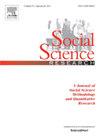COVID-19 facial covering during outdoor recreation reflects historical disease prevalence and culture above and beyond governmental measures – A study in 53 countries
IF 3.5
2区 社会学
Q1 SOCIOLOGY
引用次数: 0
Abstract
The COVID-19 pandemic severely influenced human behavior due to governmental restrictions. In addition to administrative restrictions, other factors, like historical disease prevalence and culture might impact on recent behavior. The parasite stress theory of values and sociality predicts an influence of historical diseases on human culture and may be of important influence on current human behavioral responses towards the pandemic. To address the influence on behavior, we studied mask use in outdoor recreationists (N = 4863) from 53 cultures. Studying outdoor recreationists is advantageous because people have at least some choices over their mask use, and it is less strictly controlled. We hypothesize that pathogen prevalence and cultural values of a society predict mask usage above and beyond the simplistic explanation of the strength of the governmental pandemic-related restrictions. Our results indicate that societal variables, especially individualism, contribute to the mask use during leisure activities, with people from more individualistic societies reporting lesser mask usage. Further, historic pathogen prevalence has a significant influence on mask use, even when controlling for the stringency measures of the government, HDI and population density. Zoonotic disease richness, however, did not receive significance. A mediation model showed that historical pathogen prevalence had an indirect effect on mask use, via the two pathways collectivism-individualism and governmental regulations. The total effect size of pathogen prevalence on mask use was 0.61, and with 0.24 as direct, and 0.37 indirect effects. Our data fit into the parasite stress theory of values and sociality. Our results provide evidence that the governmental decisions and restrictions themselves are influenced by the historical pathogens.
户外娱乐期间的COVID-19面部覆盖反映了政府措施之外的历史疾病流行和文化——一项针对53个国家的研究
由于政府的限制,COVID-19大流行严重影响了人类的行为。除了行政限制,其他因素,如历史疾病流行和文化可能会影响最近的行为。关于价值观和社会性的寄生虫压力理论预测了历史上的疾病对人类文化的影响,并可能对当前人类对大流行的行为反应产生重要影响。为了解决对行为的影响,我们研究了来自53个文化的户外游憩者(N = 4863)的口罩使用情况。研究户外娱乐人士是有利的,因为人们至少在口罩的使用上有一些选择,而且没有那么严格的控制。我们假设,一个社会的病原体流行程度和文化价值观对口罩使用的预测,超出了对政府大流行相关限制力度的简单解释。我们的研究结果表明,社会变量,特别是个人主义,有助于在休闲活动中使用口罩,来自更个人主义社会的人报告较少使用口罩。此外,即使考虑到政府的严格措施、人类发展指数和人口密度,历史病原体流行率对口罩使用也有显著影响。然而,人畜共患疾病丰富度没有得到显著性。一个中介模型表明,历史病原体流行率通过集体主义-个人主义和政府管制两种途径间接影响口罩的使用。病原流行对口罩使用的总效应量为0.61,其中直接效应为0.24,间接效应为0.37。我们的数据符合价值观和社会性的寄生虫压力理论。我们的研究结果证明,政府的决策和限制本身受到历史病原体的影响。
本文章由计算机程序翻译,如有差异,请以英文原文为准。
求助全文
约1分钟内获得全文
求助全文
来源期刊

Social Science Research
SOCIOLOGY-
CiteScore
4.30
自引率
4.00%
发文量
0
审稿时长
65 days
期刊介绍:
Social Science Research publishes papers devoted to quantitative social science research and methodology. The journal features articles that illustrate the use of quantitative methods in the empirical solution of substantive problems, and emphasizes those concerned with issues or methods that cut across traditional disciplinary lines. Special attention is given to methods that have been used by only one particular social science discipline, but that may have application to a broader range of areas.
 求助内容:
求助内容: 应助结果提醒方式:
应助结果提醒方式:


